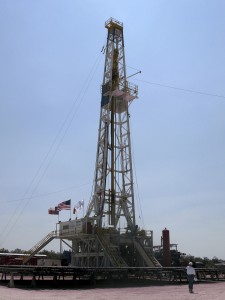Sunset Bill Packs More Than New Name For Railroad Commission

REUTERS /Anna Driver/LANDOV
While it's called the Railroad Commission of Texas, it actually deals with regulating oil and gas in the state. A name change could be in the works this legislative session.
Update, May 2, 2013: The Senate Bill passed on the Senate floor today, and now heads to the House.
Original story, April 24, 2013:
SB 212, which would change the name of the Railroad Commission of Texas to the Texas Energy Resources Commission passed out committee today. The bill would also restrict campaign contributions for Commissioners, their ability to run for a different office while overseeing the Commission and institute a pipeline permit fee. There were no amendments. The bill now heads to the Senate floor.
The Railroad Commission wields a big stick in Texas. It regulates the state’s most profitable industry, oil and gas, and all Texans elect its three commissioners. One thing the Railroad Commission doesn’t control, however, is railroads.
A bill discussed at a Senate Natural Resources Committee meeting Tuesday would rename the Railroad Commission to the Texas Energy Resources Commission, and implement other reforms as part of the Sunset review process.
Few oppose a more apt title for the agency, but wrapped up in the legislation are also rules restricting campaign contributions for commissioners and their ability to run for a different office while overseeing the commission.
What “we’d like to see changed in the bill are the resign-to-run [provision] and the two ethics financial issues,” relative newcomer Commissioner Christi Craddick said during testimony. “But otherwise I’d like to see this bill move.”
The bill, SB 212 by State Sen. Robert Nichols, R-Jacksonville, embodies a previous Sunset review of the Railroad Commission that didn’t pass in the last legislative session that would forbid certain campaign contributions. For instance, commissioners could not accept donations from a party involved in a contested case hearing. It would also limit campaign contributions to the 17 months before an election and 30 days after. Commissioners are elected to six-year terms.
A contested case hearing is the way citizens protest against an oil and gas company permit or action.
Barry Smitherman, Chairman of the Railroad Commission, said during testimony that the campaign restrictions were “tricky” because the commissioner position is elected statewide, the state is big, travel is necessary and commissioners must raise money.
State Sen. Rodney Ellis, D-Houston, who sits on the committee, said the Sunset Commission had thought hard about how to put reasonable limits on the campaign financing.
“Sitting there for a six-year term, being able to raise unlimited amounts of money from the industry that they regulate, there clearly is a perception problem,” said Ellis.
The Railroad Commission should be subject to restrictions that differ from other statewide elected officials, like senators and representatives, because the nature of the commission is unique, Nichols said, because the commissioners have six-year terms, they regulate a specific industry and they set rates.
Similar Sunset legislation for the commission originating in the House, HB 2166 by State Rep. Dennis Bonnen, R-Angleton, recently passed out of committee, but largely stripped of the campaign and ethics reform, according to Texas Energy Report. That bill could end up competing with the Senate bill discussed Tuesday.
Automatic Resignation
Commissioners were concerned about another aspect of the bill, which would require automatic resignation if they chose to run for another office more than 18 months before the end of their term.
There has been a perception that the office is a stepping stone to run for higher office, Nichols said.
Craddick said such a rule, if it were to be implemented, should apply to all the statewide elected officials, not just the Railroad Commission.
Name Change
The Railroad Commission is one of the oldest state agencies in Texas, having started in 1891, But it hasn’t regulated railroads since 2005. For reasons of transparency, Nichols said, the agency’s name should reflect its duties.
No one testified specifically against the name-change provision. Craddick suggested the more succinct Texas Energy Commission. State Sen. Glen Hegar, R-Katy, who worked on the Sunset review that failed to pass in the last legislative session, also suggested a new name.
“I’d like to change it to Texas Department on Oil and Gas because it sounds cool … TDOG,” Hegar said.
As of 5 p.m. Tuesday, the meeting had not re-convened since breaking earlier in the day for a Senate floor hearing.

